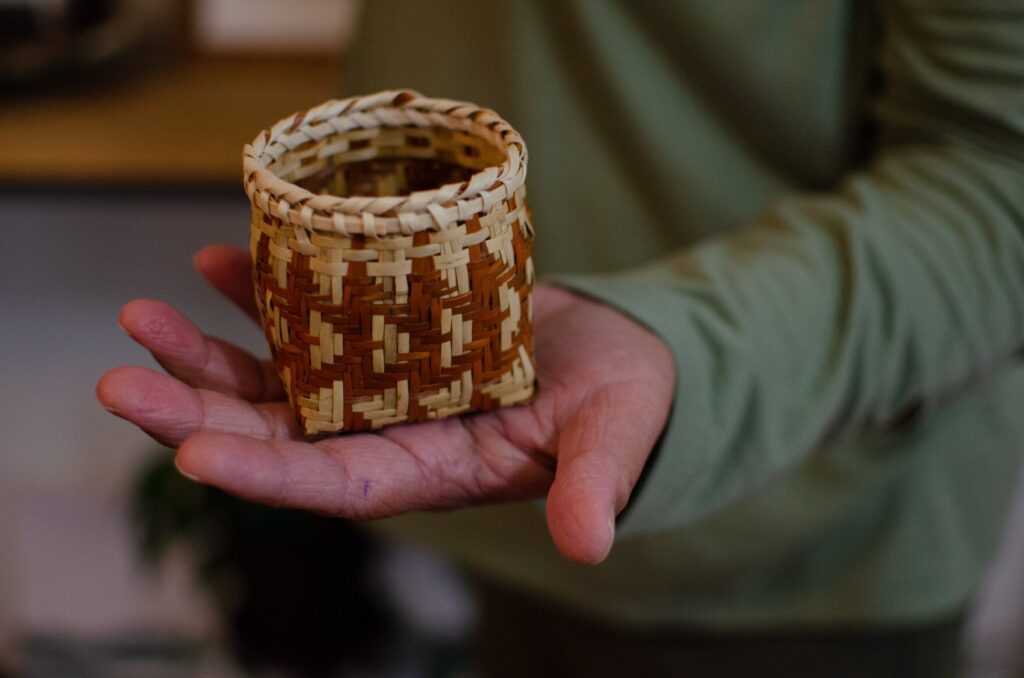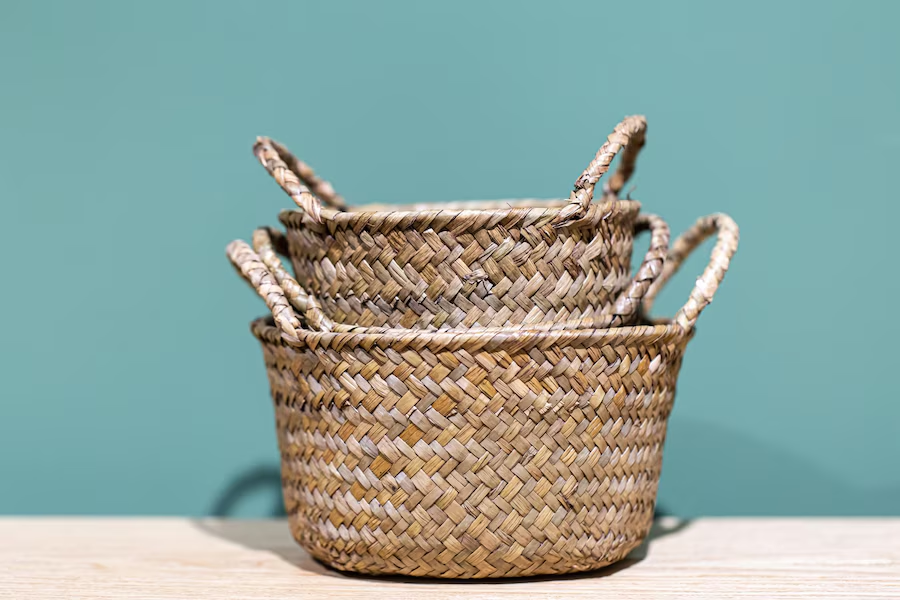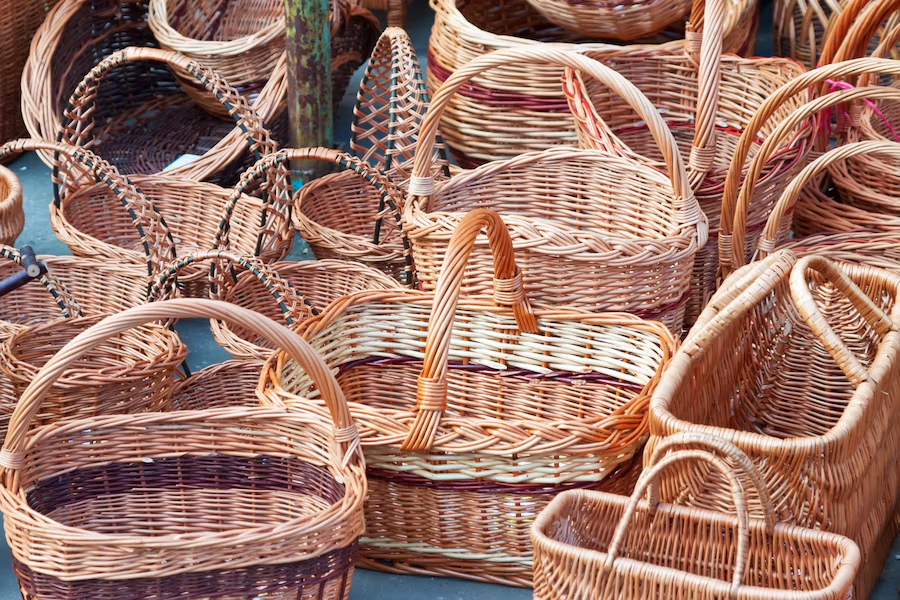The Handmade basket manufacturer in Bangladesh is a thriving and culturally rich sector. It has been an integral part of the country’s heritage for centuries.
Craftsmen and artisans in Bangladesh have perfected the art of creating exquisite handmade baskets using traditional techniques and locally sourced materials. These baskets are not just functional items but also pieces of art. Reflecting the rich cultural heritage and skilled craftsmanship of the Bangladeshi people.
We have Jute Baskets, Seagrass Baskets, and Kaisa Baskets as some of the prominent varieties crafted in Bangladesh. Jute Baskets are made from versatile and eco-friendly jute fibers. They are known for their durability and natural appeal. Seagrass Baskets, woven from seagrass reeds, offer a unique texture and are popular for their rustic charm. Kaisa Baskets, crafted from the sturdy kaisa grass, are celebrated for their strength and intricate designs. Each type of basket tells a story of tradition, creativity, and sustainability.
These handmade baskets not only serve practical purposes but also serve as decorative pieces.
In this blog, we will delve into the world of handmade baskets in Bangladesh. Exploring the traditional techniques, the various types of baskets produced, the top manufacturers in the industry, the challenges faced, and the global impact of these beautifully crafted items. This journey will uncover the beauty and significance of handmade baskets in Bangladesh.
Join us as we embark on a fascinating story through the intricate world of handmade Bangladesh baskets.
Traditional Handmade Baskets Weaving Techniques in Bangladesh
Basket weaving in Bangladesh is an ancient craft, deeply rooted in tradition and passed down through generations. Skilled Bangladeshi artisans employ several intricate techniques to create handmade baskets. Preserving the cultural heritage of the country.
One of the primary techniques involves coiling. Here thin strands of materials like jute, seagrass, or kaisa grass are wrapped around a central core, forming a spiral. This coiling method allows artisans to create various shapes and sizes of baskets. Each requires meticulous attention to detail.
Another prevalent technique is plaiting. Here strips of materials are woven together in a pattern, creating a sturdy and aesthetically pleasing structure. The plaiting method is often used for crafting handles and decorative elements on the baskets.
Twining is yet another technique where two strands of materials are twisted around each other, creating a strong and durable weave. These techniques require not just skill but also a deep understanding of the materials used. It ensures the final product is not only beautiful but also functional and long-lasting.

Image Source: https://gardening.org/
The cultural significance of these techniques:
The traditional basket weaving techniques in Bangladesh hold immense cultural significance. They are more than just methods of crafting functional items. They are a testament to the rich heritage and artistic prowess of the Bangladeshi people. These techniques are often passed down from one generation to another. Strengthening the bonds within families and communities.
Moreover, basket weaving is deeply intertwined with Bangladeshi culture and daily life. These handmade baskets are used in various cultural and religious ceremonies, symbolizing unity, harmony, and prosperity.
They are also used in households for storing grains, fruits, and other essentials. Additionally, the intricate patterns and designs woven into the baskets often carry symbolic meanings. It reflects the cultural beliefs and traditions of different regions in Bangladesh.
By preserving and practicing these traditional basket weaving techniques, Bangladeshi artisans not only contribute to the economy but also safeguard the cultural heritage of their nation. Each handmade basket tells a story of skill, creativity, and cultural identity. Making them cherished artifacts both within Bangladesh and around the world.
Quality and Sustainability Practices in Handmade Basket Production
Maintaining high-quality standards in handmade basket manufacturing is paramount for several reasons.
By integrating these quality and sustainability practices, we, handmade basket producers can create products that are not only of superior quality but also environmentally responsible, socially conscious, and economically viable for the communities involved.
Skillful Craftsmanship:
- Ensure artisans have proper training and skills to create high-quality, durable baskets.
- Encourage continuous skill development and learning among artisans.
Material Selection:
- Choose high-quality, natural, and sustainable materials like bamboo, rattan, jute, or other locally sourced fibers.
- Inspect materials for consistency and quality to ensure the longevity and durability of the final product.
Design and Creativity:
- Foster creativity among artisans to develop unique and appealing basket designs.
- Balance aesthetics with functionality, ensuring the baskets are both attractive and practical.
Quality Control:
- Implement rigorous quality control measures at different stages of production to identify and rectify defects.
- Conduct regular inspections to maintain consistent quality across all baskets.
Customer Feedback:
- Gather feedback from customers to understand their preferences and improve designs accordingly.
- Use feedback to enhance product quality and customer satisfaction.
Environmentally Friendly Materials:
- Emphasize the use of natural, biodegradable, and renewable materials to reduce the environmental impact.
- Explore alternative materials that are eco-friendly and sustainable.
Waste Reduction:
- Minimize waste by optimizing material usage and encouraging creative use of scraps.
- Implement recycling programs for any unavoidable waste generated during production.
Energy Efficiency:
- Optimize energy use in production facilities through efficient lighting, machinery, and heating/cooling systems.
- Invest in renewable energy sources like solar panels to power the production process.
Local Sourcing:
- Source materials locally to support local economies and reduce the carbon footprint associated with transportation.
- Develop partnerships with local farmers and suppliers to ensure a sustainable supply chain.
Fair Trade and Ethical Practices:
- Ensure fair wages and safe working conditions for artisans and workers involved in the production process.
- Support fair trade practices to empower local communities and promote social sustainability.
Community Engagement:
- Engage with the local community, providing education and training about sustainable practices.
- Contribute to community development projects to enhance the overall well-being of the community.
Certifications and Standards:
- Obtain certifications like Fair Trade, Forest Stewardship Council (FSC), or other relevant certifications to validate sustainable practices.
- Adhere to international standards for ethical production and environmental conservation.
Longevity and Reparability:
- Design baskets with durability in mind, encouraging customers to use them for a long time.
- Offer repair services to extend the lifespan of baskets, reducing the demand for new products.
Introduction to Popular Types of Handmade Baskets – Best Handicraft Manufacturer and Exporter in Bangladesh

Image Source: https://mymodernmet.com/
From the sturdy elegance of jute baskets to the rustic charm of seagrass weaves and the timeless allure of kaisa baskets, the craft of basket-making in Bangladesh is a captivating fusion of heritage and innovation. These handmade baskets serve functional purposes and embody the rich cultural tapestry of Bangladesh.
Jute Baskets:
Jute baskets are crafted from versatile jute fiber, a plant-based material native to Bangladesh. These baskets boast a natural, earthy charm with their coarse texture and neutral colors. Jute baskets are known for their durability and sturdiness, making them ideal for holding heavy items.
General Use-Cases:
- Storage: Jute baskets are commonly used for storing household items like blankets, toys, and laundry.
- Shopping: Lightweight jute baskets are popular choices for eco-friendly shopping bags.
- Decor: Smaller jute baskets serve as decorative pieces, adding a rustic touch to home interiors.
Different Types of Jute Baskets in Bangladesh
Baby Holder Basket
Small, lightweight baskets designed to hold baby or their essentials. Organizes diapers, toys, and baby accessories, keeping them within easy reach.
Jute Ladies Bag
Stylish handbags woven from jute fibers offer both fashion and functionality. Ideal for everyday use, adding a touch of eco-friendly elegance to outfits.
Jute Laundry Basket
Sturdy baskets with handles, provide ample space for laundry items. Efficiently organizes dirty clothes, streamlining the laundry process.
Jute Placemat-Coasters
Handwoven placemats and coasters made from jute, enhance dining setups. Protects tables from heat and spills, elevating the dining experience with a natural touch.
Jute Planter Basket
Decorative baskets designed for potted plants, enhancing indoor gardens. Displays plants elegantly, adding a touch of greenery to living spaces.
Jute Storage Basket
Versatile storage solutions with various sizes and compartments. Organizes household items, maintaining clutter-free rooms.
Seagrass Baskets:
Seagrass baskets are woven from seagrass reeds, resulting in a smooth and consistent texture. These baskets often feature intricate patterns and designs, showcasing the artistry of Bangladeshi craftsmen. Seagrass baskets come in various shapes and sizes, offering both style and functionality.
General Use-Cases:
- Organizing:
Seagrass baskets are excellent for organizing items like magazines, remote controls, and toiletries.
- Planters:
Lined seagrass baskets are used as planters, adding a natural touch to indoor gardens.
- Gift Hampers:
Small seagrass baskets are popular choices for presenting gift hampers due to their elegant appearance.
Different Types of Seagrass Baskets in Bangladesh
Seagrass Belly Baskets
Wide-brimmed baskets with a belly shape, perfect for storage and decoration. Adds a decorative touch while organizing various items.
Seagrass Egg Holder Baskets
Compact baskets are designed for delicate egg storage. Safely stores eggs, keeping them secure and accessible in the kitchen.
Seagrass Fruit-Vegetable Tray
Tray-style baskets with compartments, ideal for displaying fruits and vegetables. Enhances kitchen decor while encouraging healthy eating habits.
Seagrass Kitchen Baskets
Functional baskets for kitchen utensils, napkins, or condiments. Perfect for organizing kitchen essentials and promoting efficient cooking.
Seagrass Ladies Bag
Stylish handbags woven from seagrass fibers, blend fashion with eco-consciousness. Fashionable accessory for various occasions, making a statement sustainably.
Seagrass Laundry Basket
Sturdy laundry baskets with generous capacity. Organizes and transports laundry, maintaining order in the laundry room.
Seagrass Picnic Basket
Portable baskets with compartments, ideal for picnics and outdoor dining. Carries picnic essentials, ensuring a stylish and organized outdoor dining experience.
Seagrass Pillow Seat
Cushioned seating made from seagrass, provides comfortable floor seating. Offers cozy seating in living rooms or outdoor spaces, combining comfort with natural aesthetics.
Seagrass Placemat-Coasters
Placed under dinner plates. These seagrass placemats enhance the dining experience with a touch of nature, adding an earthy vibe to the table setting.
Seagrass Planter Basket
Baskets are designed specifically for potted plants, adding an organic touch to indoor gardening. Displays plants creatively, enhancing the ambiance of homes and offices.
Seagrass Shopping Bag
Environmentally friendly shopping bags woven from seagrass fibers. Reusable alternative to plastic bags, promoting eco-conscious shopping habits.
Seagrass Storage Basket
Spacious and durable baskets for various household items. Keeps rooms clutter-free, organizing toys, linens, or accessories.
Seagrass Toy Holder Basket
Large baskets designed for toy storage, encouraging tidiness in children’s rooms. Stores toys neatly, promoting a sense of organization among kids.
Kaisa Baskets:
Kaisa baskets are crafted from kaisa grass. A sturdy and flexible material found in abundance in Bangladesh. These baskets are characterized by their strength and resilience, making them suitable for heavy-duty usage. Kaisa baskets often feature tight weaves and intricate patterns, showcasing the craftsmanship of Bangladeshi artisans.
General Use-Cases:
- Storage:
Kaisa baskets are used for storing firewood, fruits, and vegetables due to their strength and durability.
- Laundry:
Large kaisa baskets with lids are commonly used for storing laundry, keeping the contents hidden and organized.
- Home Decor:
Kaisa baskets with decorative patterns serve as stylish additions to home decor, enhancing the ambiance of living spaces.
Different Types of Kaisa Baskets in Bangladesh
Kaisa Placemat
Elegant placemats woven from kaisa grass, enhance dining tables. Protects dining surfaces while adding a touch of natural sophistication to table settings.
Kaisa Storage Basket
Sturdy and practical baskets crafted from kaisa grass. Organizes personal items or household belongings, ensuring spaces are well-organized and visually appealing.
Each type of handmade basket from Bangladesh offers a unique blend of functionality and aesthetic appeal. These baskets reflect the cultural heritage and skilled craftsmanship of Bangladeshi artisans.
Challenges Faced by Best Handicraft Manufacturer and Exporter in Bangladesh

Image Source: https://img.freepik.com/
Navigating these challenges requires a multi-faceted approach. Including support from governments and NGOs, access to skill development programs, fair trade practices, and promoting consumer awareness about the value of handmade, sustainable products.
By addressing these challenges collectively, the handmade basket industry can continue to thrive while preserving traditional craftsmanship and promoting ethical, environmentally friendly practices.
Market Competition:
Handmade basket manufacturers face intense competition from mass-produced items. Those are often cheaper due to economies of scale. This can make it challenging for handmade baskets to compete in price-sensitive markets.
Imported baskets from other countries can flood the local market. They offered different styles potentially impacting the sales of locally crafted baskets.
Raw Material Availability and Quality:
The availability of raw materials like jute, seagrass, and kaisa grass can be inconsistent due to seasonal factors and environmental conditions. Sudden shortages can disrupt production schedules.
Ensuring consistent quality in natural fibers is essential. Variations in the quality of raw materials can affect the durability and aesthetics of the final products.
Economic Challenges:
Economic downturns and fluctuations in consumer spending patterns can affect the demand for non-essential items like handmade baskets. During economic crises, consumers might prioritize essential goods, impacting sales.
Fluctuating labor costs, transportation expenses, and overheads can strain the budgets of handmade basket manufacturers. Adapting to these cost changes while maintaining product affordability is a constant challenge.
Skilled Labor Shortage:
The art of handmade basket weaving relies on traditional skills. The challenge lies in finding and retaining skilled artisans who are willing to continue this legacy.
Many skilled artisans are aging. And there might be a lack of younger generations interested in learning and continuing these intricate weaving techniques.
Access to Markets and Technology:
Small-scale artisans often face challenges in accessing larger markets, both domestically and internationally. Limited exposure hampers their ability to reach a broader customer base.
Embracing technology for online sales, marketing, and payment processing can be challenging for artisans with limited resources and technological expertise.
Sustainability and Environmental Concerns:
Balancing the demand for handmade baskets with sustainable practices is crucial. Ethical sourcing of materials and eco-friendly production methods are becoming increasingly important to environmentally conscious consumers.
Addressing waste generated during the production process is essential. Finding eco-friendly solutions for leftover materials and production by-products is a challenge that requires innovative approaches.
Supporting Local Artisans: Initiatives and Organizations in Bangladesh
By actively engaging with different initiatives and organizations, we can make a meaningful difference in the lives of local artisans in Bangladesh. It ensures the preservation of traditional crafts and the economic well-being of the artisan communities.

Image Source: https://wvpublic.org/
Bangladesh Rural Advancement Committee (BRAC):
Initiative:
BRAC supports artisans by providing training, access to resources, and market linkages. They empower local artisans, including basket weavers, through skill development programs and financial support.
How We Can Contribute:
We can support BRAC by donating to their programs or purchasing products made by artisans affiliated with BRAC. By buying handmade baskets directly from these artisans, consumers contribute to their livelihoods.
Bangladesh Handicrafts Manufacturers & Exporters Association (BHMEA):
Initiative:
BHMEA works to promote Bangladeshi handicrafts, including handmade baskets, on the global market. They provide resources and expertise to artisans, helping them expand their reach and connect with international buyers.
How We Can Contribute:
We can support BHMEA’s initiatives by advocating for fair trade practices and purchasing handmade baskets from their member artisans. By supporting ethical trade, consumers ensure artisans receive fair compensation for their work.
Diamond Crafts (PVT.) Ltd.:
Initiative:
Diamond Jute Diversification & Co. stands as a distinguished name in Handmade Baskets Manufacturer in Bangladesh, recognized for its exceptional quality and competitive prices in the market. With a strong commitment to preserving traditional craftsmanship, we collaborate closely with local artisans. Our skilled workforce, hailing from diverse backgrounds, ensures the production of a wide array of jute-diversified handicraft products. At the heart of our operation lies our spacious infrastructure, enabling us to meet the demands of our clients effectively. Upholding fair wages and sustainable employment, we take pride in offering high-quality, ethically crafted Handmade Baskets in Bangladesh.
How We Can Contribute:
We can support them by buying handmade baskets directly from their website or participating in workshops and events organized by the organization. Additionally, sharing their initiatives on social media platforms can raise awareness about their work.
Bangladesh Crafts Council:
Initiative:
Bangladesh Crafts Council promotes traditional crafts and artisans in Bangladesh. They organize exhibitions, workshops, and training programs to showcase the skills of local artisans and help them expand their businesses.
How We Can Contribute:
We can attend exhibitions organized by the Bangladesh Crafts Council to purchase handmade baskets and other crafts directly from artisans. Sharing information about these events can also encourage others to participate and support the local artisan community.
Local Artisan Cooperatives:
Initiative:
Various local artisan cooperatives operate in different regions of Bangladesh. Supporting weavers and craftsmen by providing them with collective marketing opportunities, access to resources, and skill development training.
How We Can Contribute:
We can seek out and purchase handmade baskets from local artisan cooperatives. By buying directly from these cooperatives or participating in community events, consumers directly support the artisans and their communities.
Top Handmade Basket Manufacturer in Bangladesh
Diamond Jute Diversification & Co. stands out as one of the leading handmade basket manufacturers in Bangladesh. Known for their exceptional craftsmanship, commitment to quality, and innovative designs. With 19 years of experience, the company has become synonymous with premium handmade baskets that blend traditional techniques with contemporary aesthetics.
We stand as a testament to the artistic excellence and dedication of Bangladeshi artisans. Our commitment to innovation, sustainability, and quality has positioned them as a top choice for handmade baskets, both locally and globally.
Innovative Designs:
We pride ourselves on creating baskets with innovative and eye-catching designs. Our team of skilled artisans constantly explores new patterns, shapes, and color combinations, ensuring a diverse range of options for customers.
Customization:
One of the standout features is our ability to offer customization services. We work closely with clients to create bespoke handmade baskets tailored to specific requirements. Whether it’s for unique sizes, intricate patterns, or special occasions.
Sustainable Materials:
Our company is committed to eco-friendly practices. We utilize sustainable materials like organic jute, seagrass, and kaisa grass, ensuring that our baskets are not only beautiful but also environmentally responsible, appealing to conscious consumers.
Durability and Quality:
We are renowned for the durability and quality of our products. Each basket undergoes rigorous quality checks. Guaranteeing that customers receive baskets that are not only aesthetically pleasing but also long-lasting and functional.
Global Reach:
With a focus on international markets, we established a global presence. Our handmade baskets are exported to various countries. We gained recognition for our craftsmanship and unique designs on the international stage.
Buying Handmade Baskets in Bangladesh: Tips for Consumers

Image Source: https://img.freepik.com/
When buying handmade baskets, investing in authentic craftsmanship enhances your living space. You can now support traditional artisans and their communities. By being mindful of the tips provided and choosing ethical sources, you can contribute to the preservation of these age-old crafts while enjoying unique and beautifully crafted items.
Inspect the Weave:
Authentic handmade baskets often have irregularities in the weave, showcasing the artisan’s craftsmanship. Look for slight variations in the pattern, indicating that the basket was not mass-produced.
Check for Natural Imperfections:
Handmade baskets from natural fibers may have small imperfections. Such as knots or color variations. These imperfections are a sign of authenticity and the use of natural materials.
Feel the Texture:
Handmade baskets typically have a textured feel, with a combination of smooth and rough surfaces. This texture is a result of the weaving process and distinguishes them from machine-made counterparts.
Look for Hand-Painted Details:
Some handmade baskets feature intricate hand-painted designs. Check for brushstrokes and small irregularities in the design, indicating that it was painted by hand.
Examine the Base:
Handmade baskets often have a flat, stable base. A carefully crafted base suggests skilled workmanship, ensuring the basket sits securely on surfaces.
Conclusion:
The vibrant world of handmade baskets in Bangladesh delves into the rich heritage. Here we highlighted the significance of jute, seagrass, and kaisa grass baskets. Showcasing their functional and artistic value in various aspects of daily life.
Embracing these beautifully crafted items means appreciating the stories woven into each strand. Supporting local artisans is not just a transaction. It’s an investment in culture, tradition, and the livelihoods of the talented craftsmen and women who enrich our lives with their creations.
The choice to buy these baskets from a Handmade basket manufacturer in Bangladesh is a choice you can make. It’s a commitment to preserving the soul of a nation’s heritage. It ensures that the delicate craft of handmade baskets continues to thrive for generations to come.
Let’s champion these artisans, their creativity, and the timeless elegance of handmade baskets. Let’s start making a difference.

